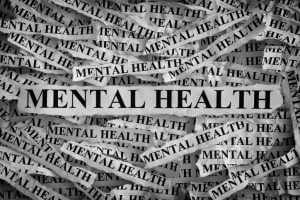
(Image via Getty)
If you’ve been a member of the legal community for more than 30 seconds, you’ve probably heard that we have some issues in the areas of anxiety, depression, drug addiction, burnout, and overall personal wellness.
From what I can tell, a lot of these things start or increase during law school, accelerate during the bar exam, and explode during the first few years in the legal profession. I have personally struggled with anxiety and burnout for many years. Because of this, I have spent the last several years researching countless resources and experimenting with different methods to help alleviate, manage, and prevent these things. If the tips and tricks I’ve picked up along the way can help even one person on their wellness journey, I’ll consider this series a wild success.

Private Practice Lawyers: Rater Your Work With In-House Counsel
Please share your thoughts in this brief and anonymous survey.
Depending on who you ask, you will find that there are anywhere between five to eight pillars or dimensions of wellness. Ever the overachiever, I prefer to use the eight-pillar model. I also believe that the eight-pillar model gives a broader foundation for wellness. For the purpose of this series, we will consider the following to be the Legal Pillars of Wellness:
- Mental & Emotional Wellness;
- Environmental Wellness;
- Physical Wellness;
- Financial Wellness;
- Spiritual Wellness;
- Intellectual Wellness;
- Occupational Wellness; and
- Social Wellness.
Over the course of the next few months, this series will explore each of these pillars of wellness in more detail. We will discuss specific wellness issues, ideas, and suggestions related to law students, bar exam takers, and lawyers. Before we embark on this journey together, the lawyer part of me feels compelled to remind you that I am not a mental health professional and that you should always seek the advice of a qualified mental health professional with any questions or concerns you may have.
Pillar #1: Mental & Emotional Wellness

2025 Legal Industry Report: Key Insights for Law Firm Growth & Efficiency
Is your firm keeping up with legal finance and tech trends? The 2025 Legal Industry Report shows how firms optimize cash flow, automate payments, and use AI. Download now for key insights.
I cannot overstate the importance of taking care of your mental and emotional wellness. I often tell my students, “If you’re not well, nothing else matters.” And, while there are seven other pillars of wellness, I most frequently find myself saying this after a student has said something like “I’m so stressed I can’t focus” or “I can’t remember the last time I had fun or felt happy.” Far too often, I find that law students, bar exam candidates, and lawyers sacrifice their mental and emotional wellness in the name of achieving their goals.
Consequences of poor mental and emotional wellness
- Increased risk for anxiety, depression, substance abuse, and burnout; warning signs may include:
- Disinterested in fun activities
- Mood swings
- Increased reliance on drugs or alcohol to cope with day-to-day life
- Sense of overwhelm
- Irritability
- Increased stress, which comes with its own side effects such as:
- Decreased focus
- Increased procrastination
- Difficulty remembering
- Impaired decision-making
- Poor judgment
- Can lead to poor physical wellness such as:
- Over/under eating
- Headaches
- Stomachaches
- Dizziness
If you’ve been on a plane, you’ve heard the flight attendants tell you that in the event of low oxygen pressure in the cabin, you should put on your own oxygen mask before helping someone else with theirs. My guess is that this is because if you start to become dizzy, confused, and short of breath, it will be really difficult for you to be helpful to anyone else.
Hopefully, after reading the above list, you now believe the same is true for your mental and emotional wellness. For law students, how effective do you think you will be on your final exams or the bar exam if you are having trouble focusing, difficulty remembering things, and experiencing increased procrastination? And as lawyers, it is probably really bad for us to have impaired decision-making and poor judgment, right?
If we are constantly sacrificing our own mental and emotional wellness to “get our work done” or “achieve the next goal” how effective are we really being and how well are we really serving?
Ideas for improving mental and emotional wellness
First, let me say that all of these ideas are merely suggestions. You don’t have to run out and implement all of them right away. In fact, I would suggest that you don’t try to implement them all right away because you will likely get overwhelmed and give up (been there, done that). Also, take what you like from this list and leave the rest. Not every idea is perfect for every person. For example, I freaking HATE journaling, but it may be totally life-changing for you. While I love doing EFT (explained below), you might think it is crazy “woo-woo” witchcraft. To each their own!
- Journaling: Explore your thoughts and feelings by keeping a journal. As I mentioned earlier, I kind of suck at this because I put a lot of pressure on myself to do it “right,” aka write neatly, do it every day, and write something important and groundbreaking each time I journal. But, the truth is, the times I find journaling most effective is when I let go of all of the things I “should” be doing and write what I feel needs to be said (no matter how messy or unimportant it may seem).
- Meditation: Think deeply and quiet your mind for short or long periods of time. This helps to break you out of the hamster wheel of work and life pressures and gives you some time to reconnect your mind and body. Meditation is truly a practice. I’ve been doing it regularly for years and some days I still can barely focus for 30 seconds, other days I can get totally zen for 15 minutes. What is important is that you keep showing up and trying. My current favorite app for meditation is Calm,
- Visualization: You can use visualization techniques to help yourself stay focused and centered on your goals amidst the craziness of day-to-day life. You can come up with your own visualization scripts or find many diverse and free ones YouTube.
- Affirmations: Write down positive sayings to counteract negative thoughts. For example, if you constantly find yourself saying, “I’m so stressed out, I have no time to do anything,” try saying to yourself daily, “I have all the time I need to be successful.”
- Mindfulness: Raise your awareness. A lot of the techniques we’ve already discussed incorporate mindfulness. With a quick Google search, you will find mindful walking, eating, and driving exercises that you can try to raise your awareness and live more in the present moment.
- Emotional Freedom Technique (EFT): Also referred to as “tapping” or “psychological acupressure,” this is a way to balance your energy system. Simply put, EFT is a combination of tapping on your head, face, and chest while focusing on certain places you are stuck (such as letting go of an argument you had or releasing your stress). There are about a million free YouTube videos of EFT including how to do it and different scripts you can use for releasing different blocks.
- Therapy: I firmly believe that everyone needs a therapist, but I feel even more strongly about that when it comes to law students and lawyers. There is a ton of free and helpful information out there, like this very article, about improving mental and emotional wellness. However, nothing beats working with a professional, one on one, to evaluate your specific needs and create customized strategies to meet them. This becomes of the utmost importance if you work in a particularly emotional area of the law (family court, immigration, bankruptcy, criminal law, etc.) and you absorb a lot of secondary trauma.
- Set Boundaries: No one is going to remind you to take care of yourself. No client is going to say, “No, we can’t meet tomorrow because you need to mediate,” and no law school class will be canceled because the students are stressed out. You have to set boundaries around how much time you will spend on your school and work obligations. You need to carve out and protect time to focus on your mental and emotional wellness practices because if you don’t you will never find the time to do them.
- Be kind to yourself: You’ve chosen a difficult and high-pressure profession to be in that often makes you feel like you have to be perfect and that there is no room for mistakes. While it is obviously important that the legal profession has high standards and that we be the best we can be, so long as lawyers are also humans it will never be perfect and there will always be mistakes. The next time your humanness is showing, instead of getting mad or frustrated with yourself, practice being kind, compassionate, and forgiving of yourself instead.
- Try the 3Rs: When you feel yourself on the verge of meltdown try these three quick and easy steps to get yourself back on track:
- Recognize that you are experiencing stress in your body.
- Relax by engaging in one of the previously mentioned techniques (or something else that is soothing to you like yoga, coloring, walking your dog, etc.).
- Reroute the negative thoughts you were having that caused the stress by challenging them and coming up with a plan to move forward.
I hope you’ll spend some time today evaluating your own mental and emotional wellness and maybe try out one or two of the ideas discussed for improving this important pillar of wellness!
 Kerriann Stout is a millennial law school professor and founder of Vinco (a bar exam coaching company) who is generationally trapped between her students and colleagues. Kerriann has helped hundreds of students survive law school and the bar exam with less stress and more confidence. She lives, works, and writes in the northeast. You can reach her by email at [email protected].
Kerriann Stout is a millennial law school professor and founder of Vinco (a bar exam coaching company) who is generationally trapped between her students and colleagues. Kerriann has helped hundreds of students survive law school and the bar exam with less stress and more confidence. She lives, works, and writes in the northeast. You can reach her by email at [email protected].